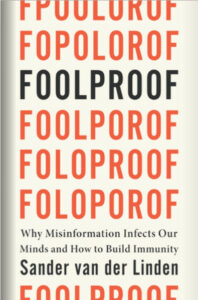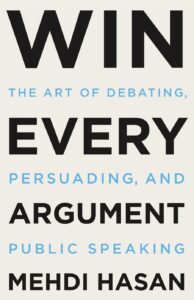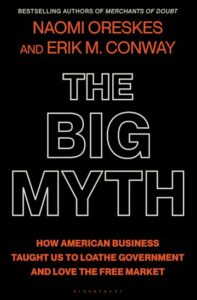Not every environmental book is an environmental book. Sometimes the best wisdom on how to protect the planet comes from books on other subjects.
Take the four books in this month’s column, for example. None of them are wholly about environmental issues, but they do focus on capitalism, misinformation, inequality and corruption — among the root causes of climate change, environmental injustice and the extinction crisis.
We can’t solve any of these crises without addressing the problems that created them in the first place, so let’s dig into these new books about the “wolves of Wall Street” and other critical topics so we can better protect wolves in the wild — not to mention ourselves.
 It’s OK to Be Angry About Capitalism
It’s OK to Be Angry About Capitalism
By Sen. Bernie Sanders with John Nichols
Sanders does two things with this new book: relitigate the 2020 presidential election season and set the stage for the progressive agenda for election seasons to come. As you might expect from the title, the majority of the book addresses the failure of big business and the government that’s supposed to regulate it. At the same time, a smaller yet significant portion of the book covers climate change and environmental justice, which were key elements of Sanders’ platform. I’d love to have seen him cover other crucial subjects like endangered species, but all the same, this is a rousing call to action for the next for the next generation of leaders — or potential leaders.
From the publisher: “Senator Bernie Sanders takes on the billionaire class and speaks blunt truths about our country’s failure to address the destructive nature of a system that is fueled by uncontrolled greed and rigidly committed to prioritizing corporate profits over the needs of ordinary Americans.”
 Foolproof: Why Misinformation Infects Our Minds and How to Build Immunity
Foolproof: Why Misinformation Infects Our Minds and How to Build Immunity
by Sander van der Linden
No lie — this is an important book. Disinformation helps fuel the climate crisis, as well as so many other problems we face today, from election denial and anti-vaccine attitudes to QAnon and anti-LGBTQ policies. Countering these threats require everyone to operate on the same baseline of truth, and that also requires understanding why mistruth is so easily duplicated from brain to brain. Reading this book will help you to fight the tendrils of misinformation working their way into your perceptions, as well as enable you to prevent them from reaching others. Whether that will help your already infected crazy uncle remains to be seen, but the fact is that this book is a must-read for anyone interested in the future of truth.
From the publisher: “Like a virus, misinformation infects our minds, exploiting shortcuts in how we see and process information to alter our beliefs, modify our memories, and replicate at astonishing rates. Once the virus takes hold, it’s very hard to cure. Strategies like fact-checking and debunking can leave a falsehood still festering or, at worst, even strengthen its hold. But we aren’t helpless. As van der Linden shows based on award-winning original research, we can cultivate immunity through the innovative science of “prebunking”: inoculating people against false information by preemptively exposing them to a weakened dose, thus empowering them to identify and fend off its manipulative tactics. Deconstructing the characteristic techniques of conspiracies and misinformation, van der Linden gives readers practical tools to defend themselves and others against nefarious persuasion — whether at scale or around their own dinner table.”
 Win Every Argument: The Art of Debating, Persuading and Public Speaking
Win Every Argument: The Art of Debating, Persuading and Public Speaking
By Mehdi Hasan
This is most definitely not an environmental book, and yet I would argue that it is. Getting to a safer, cleaner future will depend on being able to convince people of the science of climate change and the danger we face. That means breaking through disinformation — much of which is, itself, well-argued by design — and the bubbles around people’s minds. This book may offer a road map for many activists, politicians and journalists trying to have those world-saving arguments and discussions.
From the publisher: “MSNBC’s Mehdi Hasan isn’t one to avoid arguments. He relishes them as the lifeblood of democracy and the only surefire way to establish the truth. Arguments help us solve problems, uncover new ideas we might not have considered, and nudge our disagreements toward mutual understanding. A good argument, made in good faith, has intrinsic value — and can also simply be fun.”
 The Big Myth: How American Business Taught Us to Loathe Government and Love the Free Market
The Big Myth: How American Business Taught Us to Loathe Government and Love the Free Market
By Naomi Oreskes & Erik M. Conway
No one knows more about fighting unfettered capitalism than Oreskes and Conway, the authors of the classic Merchants of Doubt. Their latest book serves as a potent reminder that you can’t address the climate crisis without addressing injustice, inequality, corruption, misinformation, big business and oligarchy. It’s all connected — but then again, so are the solutions.
From the publisher: “In the early 20th century, business elites, trade associations, wealthy powerbrokers and media allies set out to build a new American orthodoxy: down with ‘big government’ and up with unfettered markets. With startling archival evidence, Oreskes and Conway document campaigns to rewrite textbooks, combat unions and defend child labor… By the 1970s, this propaganda was succeeding. Free market ideology would define the next half-century across Republican and Democratic administrations, giving us a housing crisis, the opioid scourge, climate destruction and a baleful response to the covid-19 pandemic. Only by understanding this history can we imagine a future where markets will serve, not stifle, democracy.”
What other non-environmental books are you reading that help illuminate the problems facing the planet? Send your suggestions to [email protected].
![]()
Previously in The Revelator:
The First Must-Read Environmental Books of 2023 Have Arrived


